#MeToo: Exit Clause
The biggest challenge for the MeToo movement is how to clearly identify authentic complaints, from those that lurk in the perpetual grey zone of what constitutes appropriate behaviour in such a disparate population.

The media and public’s failure to distinguish between sexual assault, consent or even second thoughts is the greatest threat to this fantastic movement disintegrating — because a lot of the stories emerging are also comically absurd.
Just as the tsunami of MeToo stories had begun receding from the front pages of newspapers, came a double whammy: allegations by women in All India Radio from remote outposts in the country, of horrendous examples of harassment. And, the sudden resignation of Flipkart co-founder Binny Bansal that has sent the start-up world into a tizzy. It is important to note that Flipkart’s parent company Walmart has acknowledged that an investigation into allegations of “serious personal misconduct” has not found any evidence of wrongdoing by Bansal (so far). Published articles indicate it’s Binny’s non-disclosure of this issue that led to his exit because global companies take transparency very seriously.
The biggest challenge for the MeToo movement is how to clearly identify authentic complaints, from those that lurk in the perpetual grey zone of what constitutes appropriate behaviour in such a disparate population. If the idea is to protect future victims and false cases against men from proliferating, the high profile ones in the news must be examined critically. For example, the flagrant abuse of power in AIR, where female comperes were afraid to speak up for fear of losing their jobs, is completely different from Bansal’s allegedly consensual relationship with a co-worker. It doesn’t deserve the headline “MeToo hits corporate India big wig”. Similarly, it’s not fair to lump one anonymous defamatory tweet (against Sacred Games writer Varun Grover) in a story that features serial predators like MJ Akbar and Alok Nath. The media and public’s failure to distinguish between sexual assault, consent or even second thoughts is the greatest threat to this fantastic movement disintegrating — because a lot of the stories emerging are also comically absurd.
Take the utterly bizarre (now bitter) Twitter exchange between authors Ira Trivedi and Chetan Bhagat, whom she has accused of sexual harassment. Bhagat reacted by alleging she wanted to kiss him because Trivedi signed off on an e-mail with ‘miss u kiss u’. Trivedi insists it was a figure of speech. If one can get past the appalling grammar and banal tone of both their e-mails, it can be argued that Trivedi is hiding behind wily, millennial, double speak. I am no Bhagat fan and this is not to say he hasn’t behaved badly with all the other women who claim he’s come onto them. But Bhagat is not Trivedi’s best friend, and by her own admission a professional acquaintance. Navigating through the endlessly complicated dance of courtship, Indian men are wired to read a sign-off like this as enthusiastic consent. Even though, what she probably intended, was to keep her options open. Wholly understandable, and I don’t know of one self respecting woman who hasn’t done exactly the same, at some point. Trivedi is not a teenager but in her late thirties and the explanation for her unconventional endearment instinctively feels like she clutching onto a loophole.
Senior journalist Tavleen Singh got a lot of flak for asking a woman who has accused Suhel Seth of misconduct, why she went back to his house alone at night when she could just as easily have said no and gone home. Seth’s cringe-inducing misdemeanours are well documented and in the public domain. Still, in my own experience as a woman, if a man is inviting you to his house after a bottle of wine, it’s not to watch Netflix. There may be a vast chasm that exists, indelibly, between men and women’s perspectives but some things don’t change and this is just common sense. The forceful chant, believe all women, resonates deeply but it’s equally crucial to recognise that a flirtation gone wrong, or a bad call after a bottle of wine, doesn’t automatically turn into MeToo.
More than just the lecherous creeps MeToo has exposed, it’s also highlighted the painstaking and shrewd tactics women are forced to employ, just to get by in the working world. For decades, women believed it’s wiser to internalise lewd gestures than to become the cynosure of all eyes by being the angry feminist who has the gall to stand up for herself. So much time and energy has been wasted on self protection. That’s changed for good, and this in itself, is remarkable progress.
hutkayfilms@gmail.com
For all the latest Opinion News, download Indian Express App
More From Leher Kala
- Jean therapy: Spinning one’s own yarn is great but wearing it is quite anotherPatanjali Paridhan is touted to be an “exclusive one-stop solution showroom”, selling everything from ethnic to formal wear, and more specifically, an original range of…
- On the Loose: Mind your MannersHalf the world’s problems would probably vanish the day people stopped dictating to other adults how they should live, and behave...
- On the loose: Burning truthHow a choked city killed a beloved festival..







































No hay comentarios:
Publicar un comentario